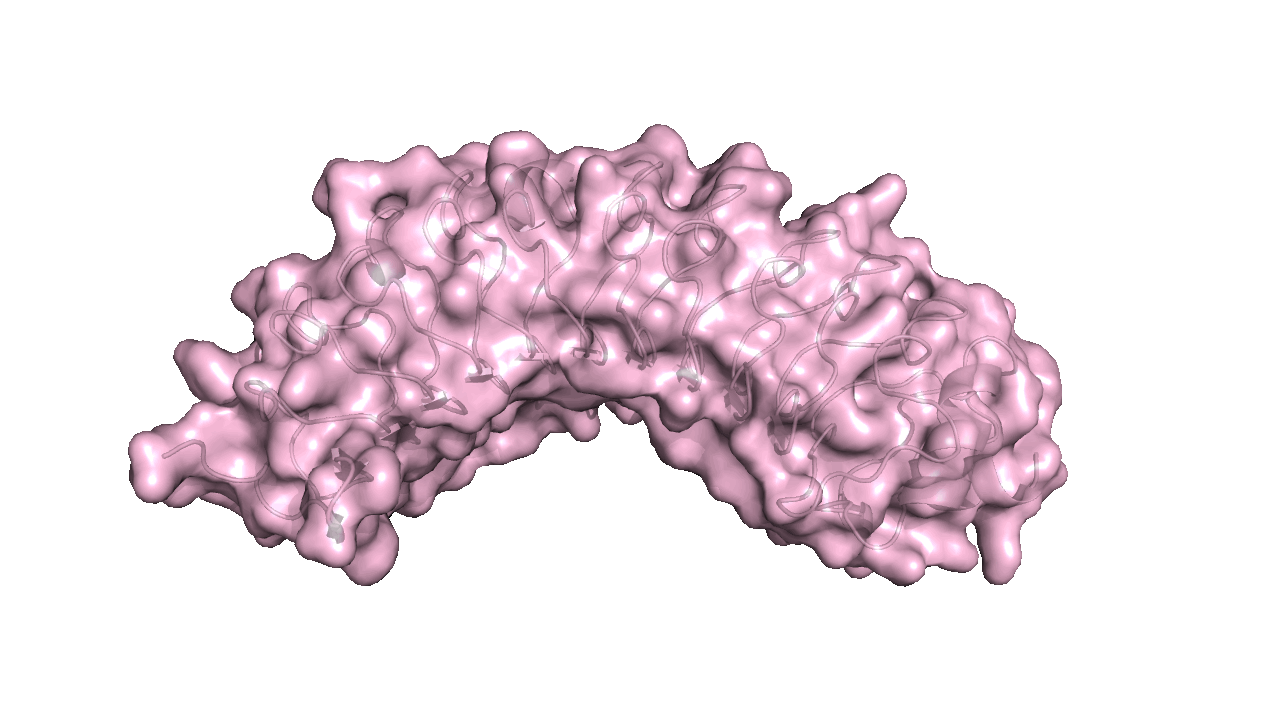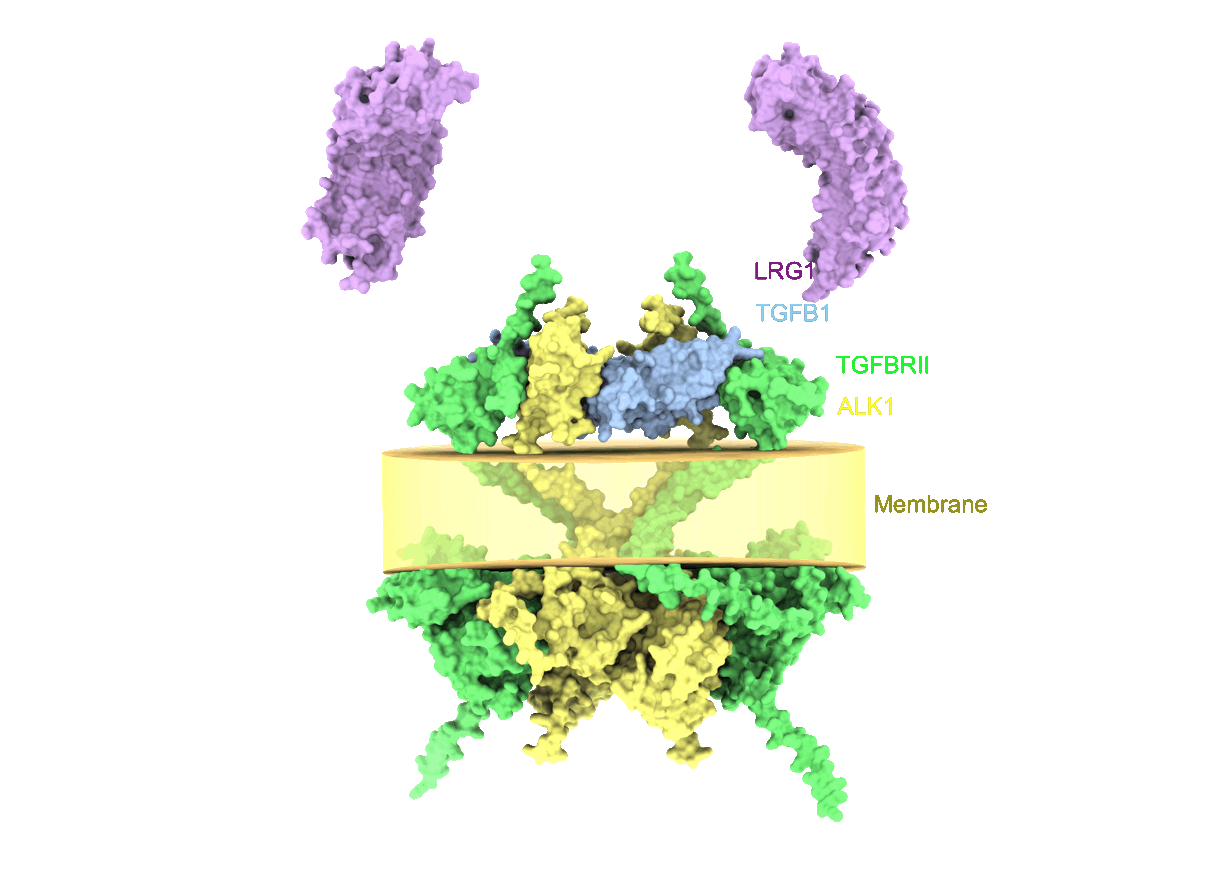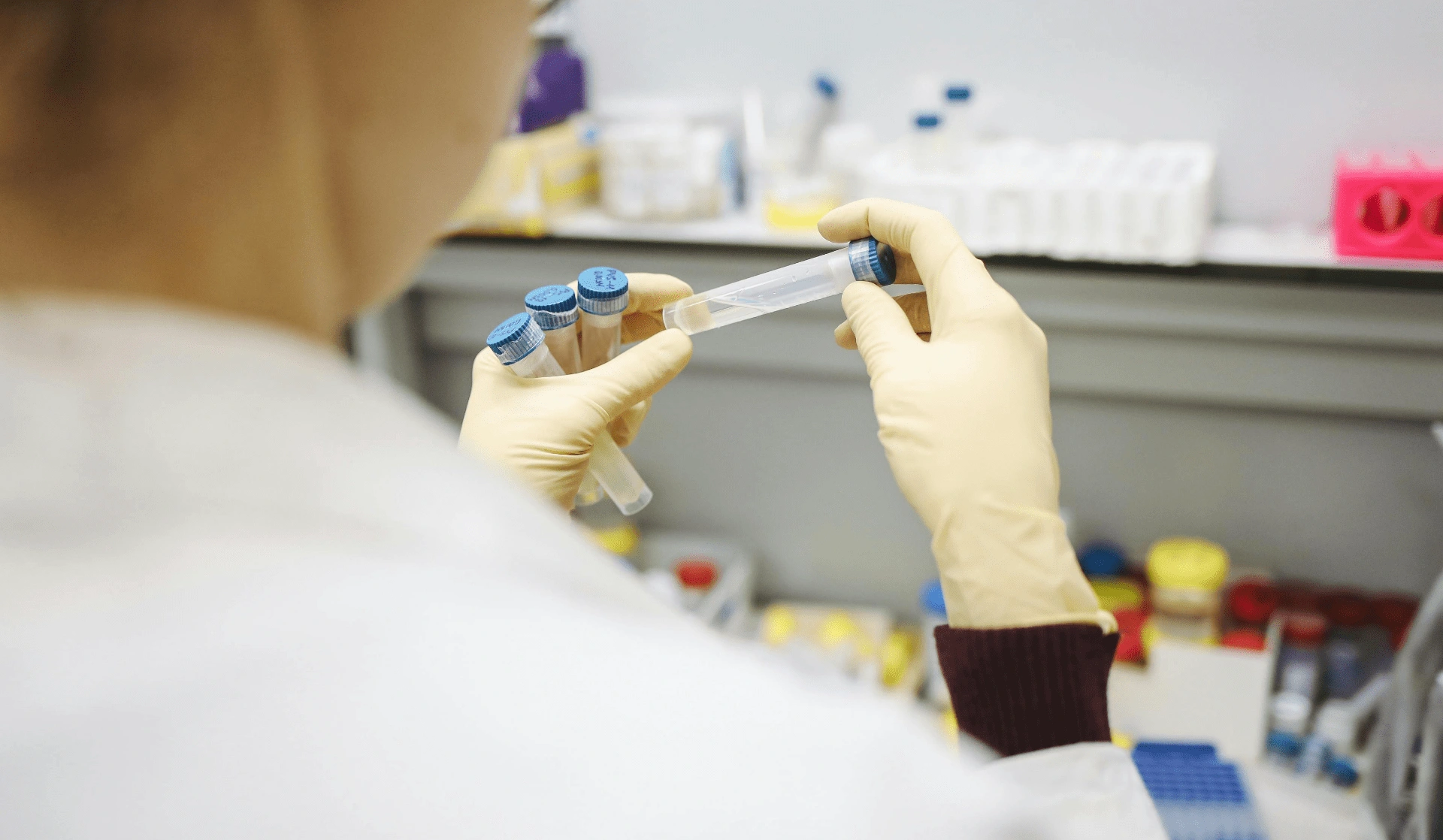Model of LRG1
Leucine-rich α-2 glycoprotein 1 (LRG1) is a secreted member of the leucine rich repeat family of proteins that under normal conditions is produced constitutively by the liver, neutrophils and a subset of monocytes. In response to damage signals, such as the cytokines IL-6 and IL-1β, LRG1 gene expression is induced in several other cell types, including endothelial and epithelial cells, leading to significant increases in local tissue levels.
Recruitment of LRG1 secreting leukocytes may also contribute to increased local tissue LRG1 concentrations. In health, raised LRG1 plays a role in cell proliferation and remodelling to facilitate the restoration of functional tissue but in many diseases, aberrant chronic expression of LRG1 maintains cells in their reparative state preventing wound resolution, stabilization and a return to cellular homeostasis.

Model of LRG1

Model of LRG1 binding to the TGFβ receptor complex on endothelial cells
LRG1 in disease
Senya’s scientific co-founders (University College London, UK) elucidated a key pathogenic role of LRG1 in driving aberrant neovascularization and published this work in a seminal paper in Nature (Wang et al., 2013). LRG1 was found to exert its pathogenic effect through corrupting homeostatic TGFβ signaling in a highly context-dependent and pleiotropic manner.
Subsequent research by the scientific co-founders, their collaborators, and others demonstrated the involvement of LRG1 in the pathogenesis of multiple human conditions, including cancer, diabetes, cardiovascular disease, neurological disease, and inflammatory disorders (For reviews see Camilli et al., 2022; De Rossi et al., 2022; Lin et al., 2022; Dritsoula et al., 2024; Chen et al., 2024).
Key Publications
LRG1 Reviews
Yang T, Xu H. The critical role of LRG1 in pathological fibrosis. J Mol Med (Berl). 2025 Oct 10. doi: 10.1007/s00109-025-02596-z. Epub ahead of print. PMID: 41071357.
Osorio-Antonio F, Diaz-González DM, Bautista-Rodríguez E, Campos-Viguri GE, Peralta-Zaragoza O, Sánchez-López JM, Cortez-Sánchez JL, Muñoz-Olivos C, Castelán F, Velázquez-Orozco V. LRG1 in cancer: mechanisms, potential therapeutic target, and use in clinical diagnosis. Mol Biol Rep. 2025 Jun 10;52(1):577. doi: 10.1007/s11033-025-10669-y. PMID: 40493117.
Wang D, Di D, Jiang B, Wang Y, Jiang Z, Jing Y, Wu H, Xin S. Revealing the multiple faces of LRG1: gene expression, structure, function, and therapeutic potential. J Adv Res. 2025 May 12:S2090-1232(25)00342-X. doi: 10.1016/j.jare.2025.05.024. Epub ahead of print. PMID: 40368176.
Chen C, Zhang J, Yu T, Feng H, Liao J, Jia Y.LRG1 Contributes to the Pathogenesis of Multiple Kidney Diseases: A Comprehensive Review. Kidney Dis (Basel). 2024 Apr 3;10(3):237-248. doi: 10.1159/000538443.
Dritsoula A, Camilli C, Moss SE, Greenwood J. The disruptive role of LRG1 on the vasculature and perivascular microenvironment. Front Cardiovasc Med. 2024 Apr 30;11:1386177. doi: 10.3389/fcvm.2024.1386177.
Camilli C, Hoeh AE, De Rossi G, Moss SE, Greenwood J. LRG1: an emerging player in disease pathogenesis. J Biomed Sci. 2022 Jan 21;29(1):6. doi: 10.1186/s12929-022-0079m0-6.
De Rossi G, Da Vitoria Lobo ME, Greenwood J, Moss SE. LRG1 as a novel therapeutic target in eye disease. Eye (Lond). 2022 Feb;36(2):328-340. doi: 10.1038/s41433-021-01807-4.
Lin M, Liu J, Zhang F, Qi G, Tao S, Fan W, Chen M, Ding K, Zhou F. J. The role of leucine-rich alpha-2-glycoprotein-1 in proliferation, migration, and invasion of tumors. Cancer Res Clin Oncol. 2022 Feb;148(2):283-291. doi: 10.1007/s00432-021-03876-0.
LRG1 and kidney disease
Chen S, Chen L, Dong R, Kou X, Luo C, Gao N, Zhao M, He M, Shi B, Jiang H, Qiang W. Integrative transcriptomic and genomic insights into diabetic kidney disease: evidence from multi-omics analysis and experimental validation. Ren Fail. 2025 Dec;47(1):2568649. doi: 10.1080/0886022X.2025.2568649. Epub 2025 Oct 15. PMID: 41097990
Okami N, Wakui H, Azushima K, Miyazawa T, Kubo E, Tsukamoto S, Sotozawa M, Taguchi S, Urate S, Ishiga K, Kinguchi S, Kanaoka T, Tamura K. Leucine-rich alpha-2-glycoprotein 1 deficiency suppresses ischemia-reperfusion injury-induced renal fibrosis. Sci Rep. 2025 Jan 8;15(1):1259. doi: 10.1038/s41598-024-84798-y.
Ye J, Qiu C, Zhang L. Knockdown of Leucine-rich alpha-2-glycoprotein 1 alleviates renal ischemia-reperfusion injury by inhibiting NOX4-mediated apoptosis, inflammation, and oxidative stress. Exp Cell Res. 2025 Jan 1;444(1):114341. doi:10.1016/j.yexcr.2024.114341.
Wang X, Sun Z, Fu J, Fang Z, Zhang W, He JC, Lee K. LRG1 loss effectively restrains glomerular TGF-beta signaling to attenuate diabetic kidney disease. Mol Ther. 2024 Sep 4;32(9):3177-3193. doi: 10.1016/j.ymthe.2024.06.027.
Altıncık SA, Yıldırımçakar D, Avcı E, Özhan B, Girişgen İ, Yüksel S. Plasma leucine-rich alpha-2-glycoprotein 1 - a novel marker of diabetic kidney disease in children and adolescents with type 1 diabetes mellitus? Pediatr Nephrol. 2023 Dec;38(12):4043-4049. doi: 10.1007/s00467-023-06019-4.
Liu JJ, Liu S, Wang J, Pek SLT, Lee J, Gurung RL, Ang K, Shao YM, Tavintharan S, Tang WE, Sum CF, Lim SC. Urine Leucine-Rich α-2 Glycoprotein 1 (LRG1) Predicts the Risk of Progression to End-Stage Kidney Disease in Patients With Type 2 Diabetes. Diabetes Care. 2023 Feb 1;46(2):408-415. doi: 10.2337/dc22-1611. PMID: 36516193
Hong Q, Cai H, Zhang L, Li Z, Zhong F, Ni Z, Cai G, Chen XM, He JC, Lee K. Modulation of transforming growth factor-β-induced kidney fibrosis by leucine-rich ⍺-2 glycoprotein-1. Kidney Int. 2022 Feb;101(2):299-314. doi: 10.1016/j.kint.2021.10.023. Epub 2021 Nov 10. PMID: 34774561
Gurung RL, Dorajoo R, M Y, Liu JJ, Pek SLT, Wang J, Wang L, Sim X, Liu S, Shao YM, Ang K, Subramaniam T, Tang WE, Sum CF, Liu JJ, Lim SC. Association of Genetic Variants for Plasma LRG1 With Rapid Decline in Kidney Function in Patients With Type 2 Diabetes. J Clin Endocrinol Metab. 2021 Jul 13;106(8):2384-2394. doi: 10.1210/clinem/dgab268. PMID: 33889958
Hong Q, Zhang L, Fu J, Verghese DA, Chauhan K, Nadkarni GN, Li Z, Ju W, Kretzler M, Cai GY, Chen XM, D’Agati VD, Coca SG, Schlondorff D, He JC, Lee K. LRG1 Promotes Diabetic Kidney Disease Progression by Enhancing TGF-β-Induced Angiogenesis. J Am Soc Nephrol. 2019 Apr;30(4):546-562. doi: 10.1681/ASN.2018060599. Epub 2019 Mar 11. PMID: 30858225
Plasma Leucine-Rich α-2-Glycoprotein 1 Predicts Rapid eGFR Decline and Albuminuria Progression in Type 2 Diabetes Mellitus.Liu JJ, Pek SLT, Ang K, Tavintharan S, Lim SC; SMART2D study. J Clin Endocrinol Metab. 2017 Oct 1;102(10):3683-3691. doi: 10.1210/jc.2017-00930. PMID: 28973352
LRG1 and cancer
Lei Z, Song S, Geng Y, Liu B, Li Y, Min H, Zhang S, Qi Y. The pan-cancer analysis of LRG1 and its potential role in kidney renal clear cell carcinoma. RSC Med Chem. 2025 Feb 11. doi: 10.1039/d4md00940a. Epub ahead of print. PMID: 40008188
Rathore M, Curry K, Huang W, Wright M, Martin D, Baek J, Taylor D, Miyagi M, Tang W, Feng H, Li Y, Wang Z, Graor H, Willis J, Bryson E, Boutros CS, Desai O, Islam BN, Ellis LM, Moss SE, Winter JM, Greenwood J, Wang R. Leucine-Rich Alpha-2-Glycoprotein 1 Promotes Metastatic Colorectal Cancer Growth Through Human Epidermal Growth Factor Receptor 3 Signaling. Gastroenterology. 2025 Feb;168(2):300-315.e3. doi: 10.1053/j.gastro.
Tan Z, Wang W, Peng J, Fan W, Cao H. Plasma Leucine-Rich Alpha-2-Glycoprotein 1 Reflects Higher Histological Grade, Worse Disease-Free Survival, and Unfavorable Overall Survival in Colorectal Cancer Patients who Receive Tumor Resection. Tohoku J Exp Med. 2024 Dec 12;264(2):101-108. doi: 10.1620/tjem.2024.J055.
Nakanishi S, Goya M, Suda T, Yonamine T, Sugawa A, Saito S. Increased level of serum leucine-rich-alpha-2-glycoprotein 1 in patients with clear cell renal cell carcinoma. BMC Urol. 2024 Apr 24;24(1):94. doi: 10.1186/s12894-024-01481-0.
Göbel A, Rachner TD, Hoffmann O, Klotz DM, Kasimir-Bauer S, Kimmig R, Hofbauer LC, Bittner AK. High serum levels of leucine-rich alpha-2 glycoprotein 1 (LRG-1) are associated with poor survival in patients with early breast cancer. Arch Gynecol Obstet. 2024 Jun;309(6):2789-2798. doi: 10.1007/s00404-024-07434-0.
Hoefsmit EP, Völlmy F, Rozeman EA, Reijers ILM, Versluis JM, Hoekman L, van Akkooi ACJ, Long GV, Schadendorf D, Dummer R, Altelaar M, Blank CU. Systemic LRG1 Expression in Melanoma is Associated with Disease Progression and Recurrence. Cancer Res Commun. 2023 Apr 20;3(4):672-683. doi: 10.1158/2767-9764.CRC-23-0015. eCollection 2023 Apr.
Singhal M, Gengenbacher N, Abdul Pari AA, Kamiyama M, Hai L, Kuhn BJ, Kallenberg DM, Kulkarni SR, Camilli C, Preuß SF, Leuchs B, Mogler C, Espinet E, Besemfelder E, Heide D, Heikenwalder M, Sprick MR, Trumpp A, Krijgsveld J, Schlesner M, Hu J, Moss SE, Greenwood J, Augustin HG. Temporal multi-omics identifies LRG1 as a vascular niche instructor of metastasis. Sci Transl Med. 2021 Sep;13(609):eabe6805. doi: 10.1126/scitranslmed.abe6805. Epub 2021 Sep 1. PMID: 34516824
Kwan YP, Teo MHY, Lim JCW, Tan MS, Rosellinny G, Wahli W, Wang X. LRG1 Promotes Metastatic Dissemination of Melanoma through Regulating EGFR/STAT3 Signalling. Cancers (Basel). 2021 Jun 30;13(13):3279. doi: 10.3390/cancers13133279. PMID: 34208965
O’Connor MN, Kallenberg DM, Camilli C, Pilotti C, Dritsoula A, Jackstadt R, Bowers CE, Watson HA, Alatsatianos M, Ohme J, Dowsett L, George J, Blackburn JWD, Wang X, Singhal M, Augustin HG, Ager A, Sansom OJ, Moss SE, Greenwood J. LRG1 destabilizes tumor vessels and restricts immunotherapeutic potency. Med. 2021 Nov 12;2(11):1231-1252.e10. doi: 10.1016/j.medj.2021.10.002. Epub 2021 Nov 3. PMID: 35590198
Guldvik IJ, Zuber V, Braadland PR, Grytli HH, Ramberg H, Lilleby W, Thiede B, Zucknick M, Saatcioglu F, Gislefoss R, Kvåle R, George A, Grönberg H, Wiklund F, Neal DE, Gnanapragasam VJ, Taskén KA, Mills IG. Identification and Validation of Leucine-rich α-2-glycoprotein 1 as a Noninvasive Biomarker for Improved Precision in Prostate Cancer Risk Stratification. Eur Urol Open Sci. 2020 Oct 13;21:51-60. doi: 10.1016/j.euros.2020.08.007. eCollection 2020 Oct. PMID: 34337468
Zhang YS, Han L, Yang C, Liu YJ, Zhang XM. Prognostic Value of LRG1 in Breast Cancer: A Retrospective Study. Oncol Res Treat. 2021;44(1-2):36-42. doi: 10.1159/000510945. Epub 2020 Nov 26. PMID: 33242858
Sun DC, Shi Y, Wang LX, Lv Y, Han QL, Wang ZK, Dai GH. Leucine-rich alpha-2-glycoprotein-1, relevant with microvessel density, is an independent survival prognostic factor for stage III colorectal cancer patients: a retrospective analysis. Oncotarget. 2017 Mar 16;8(39):66550-66558. doi: 10.18632/oncotarget.16289. eCollection 2017 Sep 12. PMID: 29029535
Wang CH, Li M, Liu LL, Zhou RY, Fu J, Zhang CZ, Yun JP. LRG1 expression indicates unfavorable clinical outcome in hepatocellular carcinoma. Oncotarget. 2015 Dec 8;6(39):42118-29. doi: 10.18632/oncotarget.5967. PMID: 26517349
Walker MJ, Zhou C, Backen A, Pernemalm M, Williamson AJ, Priest LJ, Koh P, Faivre-Finn C, Blackhall FH, Dive C, Whetton AD. Discovery and Validation of Predictive Biomarkers of Survival for Non-small Cell Lung Cancer Patients Undergoing Radical Radiotherapy: Two Proteins With Predictive Value. EBioMedicine. 2015 Jun 19;2(8):841-50. doi: 10.1016/j.ebiom.2015.06.013. eCollection 2015 Aug. PMID: 26425690
Wen SY, Zhang LN, Yang XM, Zhang YL, Ma L, Ge QL, Jiang SH, Zhu XL, Xu W, Ding WJ, Yang BQ, Zhang ZG, Teng YC. LRG1 is an independent prognostic factor for endometrial carcinoma. Tumour Biol. 2014 Jul;35(7):7125-33. doi: 10.1007/s13277-014-1953-6. Epub 2014 Apr 24. PMID: 24760273
Ladd JJ, Busald T, Johnson MM, Zhang Q, Pitteri SJ, Wang H, Brenner DE, Lampe PD, Kucherlapati R, Feng Z, Prentice RL, Hanash SM. Increased plasma levels of the APC-interacting protein MAPRE1, LRG1, and IGFBP2 preceding a diagnosis of colorectal cancer in women. Cancer Prev Res (Phila). 2012 Apr;5(4):655-64. doi: 10.1158/1940-6207.CAPR-11-0412. Epub 2012 Jan 25. PMID: 22277732
LRG1 and retinal disease
De Rossi G, Qiu AW, Berg M, Burgoyne T, Martello A, Da Vitoria Lobo ME, Rizzi M, Mueller S, Blackburn J, Meng Y, Walker-Samuel S, Shipley R, Chu CJ, Sivaprasad S, Greenwood J, Moss SE. Leucine-rich α-2-glycoprotein 1 initiates the onset of diabetic retinopathy in mice. Sci Transl Med. 2025 Oct 22;17(821):eadn6047. doi: 10.1126/scitranslmed.adn6047. Epub 2025 Oct 22. PMID: 41124286.
Yanagi Y, Ichikawa H, Nguyen LBT, Hayashi A, Abe N, Abe H, Uchida S. mRNA vaccination mitigates pathological retinochoroidal neovascularization in animal models. Vaccine. 2025 Aug 13;61:127451. doi: 10.1016/j.vaccine.2025.127451. Epub 2025 Jul 2. PMID: 40609263.
Hoeh AE, Chang JH, Mueller RS, Basche M, Fantin A, Sepetis A, De Rossi G, Dritsoula A, Ali RR, Turowski P, Moss SE, Greenwood J. LRG1 Alters Pericyte Phenotype and Compromises Vascular Maturation. Cells. 2025 Apr 14;14(8):593. doi: 10.3390/cells14080593. PMID: 40277918.
Mundo L, Tosi GM, Lazzi S, Pertile G, Parolini B, Neri G, Posarelli M, De Benedetto E, Bacci T, Silvestri E, Siciliano MC, Barbera S, Orlandini M, Greenwood J, Moss SE, Galvagni F. LRG1 Expression Is Elevated in the Eyes of Patients with Neovascular Age-Related Macular Degeneration. Int J Mol Sci. 2021 Aug 18;22(16):8879. doi: 10.3390/ijms22168879. PMID: 34445590
Wang X, Abraham S, McKenzie JAG, Jeffs N, Swire M, Tripathi VB, Luhmann UFO, Lange CAK, Zhai Z, Arthur HM, Bainbridge J, Moss SE, Greenwood J. LRG1 promotes angiogenesis by modulating endothelial TGF-β signalling. Nature. 2013 Jul 18;499(7458):306-11. doi: 10.1038/nature12345. PMID: 23868260
LRG1 and lung disease
Truchi M, Gautier-Isola M, Savary G, Scribe C, Lingampally A, Cadis H, Baeri A, Magnone V, Girard-Riboulleau C, Arguel MJ, de Schutter C, Fassy J, Boukrout N, Larrue R, Martin N, Rezzonico R, Pluquet O, Perrais M, Hofman V, Marquette CH, Hofman P, Günther A, Ricard N, Barbry P, Leroy S, Lebrigand K, Bellusci S, Cauffiez C, Vassaux G, Pottier N, Mari B. Aging affects reprogramming of pulmonary capillary endothelial cells after lung injury in male mice. Nat Commun. 2025 Aug 6;16(1):7234. doi: 10.1038/s41467-025-62431-4. PMID: 40769983
Wang Y, Jiang Y, Xie M, Qi B, Pu K, Du W, Zhang Q, Ma M, Chen Z, Guo Y, Qian H, Wang K, Tian T, Fu L, Zhang X. Cross-Sectional and Longitudinal Associations of Serum LRG1 with Severity and Prognosis Among Adult Community-Acquired Pneumonia Patients. J Inflamm Res. 2024 Nov 1;17:7951-7962. doi: 10.2147/JIR.S485932.
Nakajima H, Nakajima K, Serada S, Fujimoto M, Naka T, Sano S. The involvement of leucine-rich α-2 glycoprotein in the progression of skin and lung fibrosis in bleomycin-induced systemic sclerosis model. Mod Rheumatol. 2021 Nov;31(6):1120-1128.doi: 10.1080/14397595.2021.1883841. Epub 2021 Feb 17. PMID: 33535851
Hisata S, Racanelli AC, Kermani P, Schreiner R, Houghton S, Palikuqi B, Kunar B, Zhou A, McConn K, Capili A, Redmond D, Nolan DJ, Ginsberg M, Ding BS, Martinez FJ, Scandura JM, Cloonan SM, Rafii S, Choi AMK. Reversal of emphysema by restoration of pulmonary endothelial cells. J Exp Med. 2021 Aug 2;218(8):e20200938. doi: 10.1084/jem.20200938. Epub 2021 Jul 21. PMID: 34287647
Honda H, Fujimoto M, Serada S, Urushima H, Mishima T, Lee H, Ohkawara T, Kohno N, Hattori N, Yokoyama A, Naka T. Leucine-rich α-2 glycoprotein promotes lung fibrosis by modulating TGF-β signaling in fibroblasts. Physiol Rep. 2017 Dec;5(24):e13556. doi: 10.14814/phy2.13556. Epub 2017 Dec 26. PMID: 29279415

